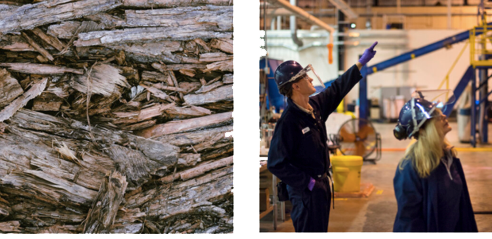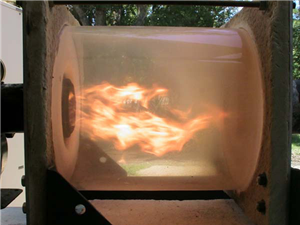The next generation of advanced biofuel has moved one step closer to market. On October 20, biofuel producer Biofine Developments Northeast Inc. and energy wholesaler Sprague Resources LP announced a transaction focused on the commercialization of a renewable fuel called ethyl levuilnate, or EL for short.
Biofine and Sprague have signed a purchase agreement for the production and marketing of EL, a product that they say is poised to revolutionize the heating oil market by transforming waste material into zero emission heating fuel. Heating oil industry insiders might recognize EL from various trade show presentations, magazine articles and association reports.
The production of energy from waste materials has been a key objective for Biofine President and CEO Dr. Stephen Fitzpatrick for more than 20 years. “After extensive research and testing, and a successful completion of a large-scale field test, we are excited to move on to the commercialization of EL,” said Fitzpatrick.

(Pictured Left) Wood residue is an example of waste used to make the next generation of advanced biofuel, ethyl levulinate (EL). Other examples include waste paper or cardboard, municipal solid waste, and food waste. (Pictured right) The Biofine technology was developed by Dr. Stephen W. Fitzpatrick and is now ready for commercial development. The pilot plant is owned and operated by the UMaine – FBRI (photo credit – UMaine-FBRI)
The Biofine production process involves converting wood waste from renewable sources such as forest residue into sulfur-free crude and heating oil alternatives. Under the direction of Fitzpatrick and Chief Development Officer Mike Cassata, Biofine has worked with the University of Maine-Forest Bioproducts Research Institute to validate and demonstrate this technology at pilot scale.
In 2019, Biofine was awarded a $750,000 grant to support the development of a large-scale biorefinery through the Maine Technology Institute’s Emerging Technology Challenge for Maine’s Forest Resources. The company has worked with Treadwell Franklin Infrastructure Capital (TFIC) as a development agent to advance multiple biorefinery projects producing EL and co-products on an industrial scale.
The Biofine technology enables the production of high-value renewable biofuels from cellulosic residues, including non-food feedstock such as wood, agricultural residues and municipal waste fiber. Forest detritus that would otherwise release methane through decomposition is given a second life.

The first market application for EL is as a zero emission heating fuel. Future opportunities may include zero emission energy options for transportation, marine and jet fuels. (Combustion testing EL fuel photo credit: NORA.)
EL’s beneficial technical qualities, including its clean-burning and cold temperature handling properties, have led the National Oilheat Research Alliance (NORA), National Energy and Fuels Institute (NEFI) and other trade associations to significantly support and embrace EL as an advanced biofuel.
One NORA report shows that EL can reduce well-to-burner-tip (WTBt) greenhouse gas emissions by 119 percent compared to ULSD.
While EL has been called a “magic fuel” by some, it has shown real potential in trial runs throughout the extreme cold climate of Maine and is now one major step closer to becoming a viable biofuel blending option or heating oil alternative for fuel suppliers in the greater Northeast.
Under the terms of the new agreement, Sprague will facilitate the commercialization of EL through its commitment to purchase and market a significant portion of the fuel produced from Biofine’s first production facility.
“We’re honored and pleased to be able to work with Sprague on this exciting undertaking, and feel our collaboration will prove to be a successful and important threshold event for the liquid fuels industry,” said Fitzpatrick. “Biofine believes strongly in the merits of our products, and we’re happy to work with an organization like Sprague, with a long history of promoting renewable liquid fuels throughout the Northeast.”
An early adopter, Sprague became the first petroleum company in the nation to earn the status of Biodiesel Board Certified BQ-9000 Marketer in 2006. In 2018, Sprague partnered with the New York City Department of Citywide Administrative Services to supply more than 1,000 city fleet vehicles with 900,000 gallons of renewable diesel produced by Renewable Energy Group.
“In our 150th year of business, this is another great example of our continued commitment to energy innovation,” said David Glendon, president and CEO of Sprague. “As customers increasingly seek to use more renewable liquid fuels, we are excited to expand our portfolio of offerings using our existing infrastructure.”
For more information, contact Mike Cassata at 617-620-8664 or mcassata@biofinetechnology.com.
